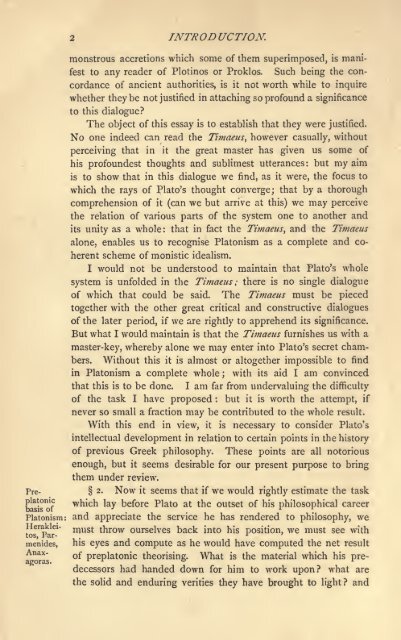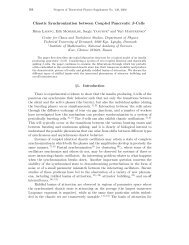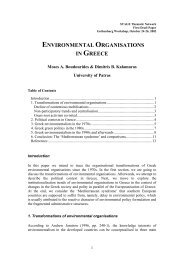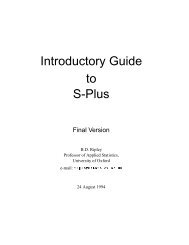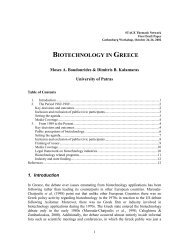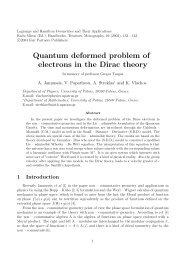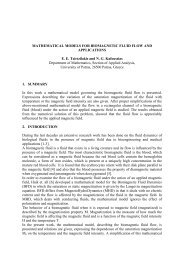- Page 1 and 2: UNIVERSITY OF CALIFORNIA, SAN DIEGO
- Page 3: JNIVERSITY OF CALIFORNIA SAN DIEGO
- Page 7 and 8: T7AATQN02 TIMAIOI THE TIMAEUS OF PL
- Page 9 and 10: PREFACE. THE present appears to be
- Page 11 and 12: PREFACE. vii this would have been s
- Page 13: INTRODUCTION. i. OF all the more im
- Page 17 and 18: INTRODUCTION. 5 time the drop reach
- Page 19 and 20: INTROD UCTION. 7 Not-being is not,
- Page 21 and 22: INTRODUCTION. 9 exist, or neither :
- Page 23 and 24: INTROD UCTION. \ I must at some poi
- Page 25 and 26: INTROD UCTION. 1 3 ledge. The natur
- Page 27 and 28: INTROD UCTIOtf. 1 5 obviously our b
- Page 29 and 30: INTRODUCTION. 17 inherent in the su
- Page 31 and 32: INTRODUCTION. 19 inevitable concomi
- Page 33 and 34: INTROD UCTION. 2 1 senses with the
- Page 35 and 36: INTROD UCTION. 2 3 is disposed of b
- Page 37 and 38: INTRODUCTION. 25 But what is the Tr
- Page 39 and 40: INTROD UCTION. 27 Moreover, putting
- Page 41 and 42: INTRODUCTION. 29 Yet, though matter
- Page 43 and 44: INTRODUCTION. 31 But we must beware
- Page 45 and 46: INTRODUCTION. 33 itself to the sens
- Page 47 and 48: INTRODUCTION. 35 pluralisation and
- Page 49 and 50: INTROD UCTION. 3 7 and orders it, w
- Page 51 and 52: - INTRODUCTION. 39 are alike eterna
- Page 53 and 54: INTROD UCTION. 4 1 itself. So then
- Page 55 and 56: INTRODUCTION. 43 in terms of the vi
- Page 57 and 58: INTROD UCTION. 4 5 in the notes; bu
- Page 59 and 60: INTRODUCTION. 47 Oflov : that is to
- Page 61 and 62: INTRODUCTION. 49 the other ideas. F
- Page 63 and 64: INTROD UCTION. 5 r nor will he do o
- Page 65 and 66:
TIMAIOS
- Page 67 and 68:
PERSONS OF THE DIALOGUE: SOKRATES,
- Page 69 and 70:
18 A] TIMAIO2. 57 Sokrates. Do you
- Page 71 and 72:
E] TIMAIO2. 59 be able to show a du
- Page 73 and 74:
TIMAIOS. 6r provision for the contr
- Page 75 and 76:
20 A] TIMAIOS. 63 tion, both when d
- Page 77 and 78:
E] TIMAIO2. 65 many witnesses that
- Page 79 and 80:
21 B] TIMAIOS. passages of his : po
- Page 81 and 82:
22 A] TIMAIDS. 69 prizes for reciti
- Page 83 and 84:
D] TIMAIO2. 71 he essayed to tell t
- Page 85 and 86:
23 B] TIMAIOS. 73 waters, those in
- Page 87 and 88:
24 A] TIMAIOS. 75 remember but one
- Page 89 and 90:
D] TIMAIO2. 77 tion of the craftsme
- Page 91 and 92:
25 c] TIMAIO2. 79 nobleness surpass
- Page 93 and 94:
26 A] TIMAIOS. 8 1 when the rest fe
- Page 95 and 96:
27 A] TIMAIO2. 83 we should be fair
- Page 97 and 98:
D] TIMAIO2. 85 his business to unde
- Page 99 and 100:
28 c] TIMAIO2. 87 existent. Now all
- Page 101 and 102:
29 c] TIMAIO2. 89 were impossible t
- Page 103 and 104:
30 A] TIMAIOS. the gods and the gen
- Page 105 and 106:
c] TIMAI02. 93 this might be, there
- Page 107 and 108:
3i B] TIMAIO2. 95 none of these whi
- Page 109 and 110:
32 A] TIMAIOS. 97 the all-perfect a
- Page 111 and 112:
c] TIMAIO2. 99 body of the universe
- Page 113 and 114:
33 c] TIMAIOS. 101 Now the making o
- Page 115 and 116:
34 A] TIMA1O2. 103 there was nothin
- Page 117 and 118:
35 A] TIMAIO2. 105 he planned for t
- Page 119 and 120:
TIMAI02. 107 way. From the undivide
- Page 121 and 122:
36 B] TIMAIO2. 109 second and tripl
- Page 123 and 124:
c] TIMAI02. ii i terms of the inter
- Page 125 and 126:
TIMAIO2. themselves and each other
- Page 127 and 128:
37 A] TIMAIO2. double and triple in
- Page 129 and 130:
c] TIMAI02. 117 the best of all tha
- Page 131 and 132:
TIMAIO2. 119 found, if a man affirm
- Page 133 and 134:
38 B] TIMAIO2. 121 named time. For
- Page 135 and 136:
XI. TIMAI02. 123 Time then has come
- Page 137 and 138:
TIMAI02. 12$ but having a contrary
- Page 139 and 140:
39 A] TIMAI02. 127 But when each of
- Page 141 and 142:
D] TIMAIOS. 129 taneous motion in t
- Page 143 and 144:
40 A] TIMAIOS. 131 when the relativ
- Page 145 and 146:
TIMAI02. 133 each, one in the same
- Page 147 and 148:
TIMAIO2. 135 to be the guardian and
- Page 149 and 150:
4i A] TIMAI02. 137 very movements w
- Page 151 and 152:
c] TTMAI02. 139 by me coming into b
- Page 153 and 154:
TIMAIO2. 141 Therefore in order tha
- Page 155 and 156:
42 B] TIMAI02. 143 each star, and s
- Page 157 and 158:
TIMAIOS. as are of a contrary natur
- Page 159 and 160:
43 A] TIMAI02. 147 each of them, Go
- Page 161 and 162:
D] TIMAIO2. 149 flowing and out-flo
- Page 163 and 164:
44 Bl TIMAIOl 151 they displaced, s
- Page 165 and 166:
flows in with smaller volume, and t
- Page 167 and 168:
45 B] TIMAI02. 155 XVI. Imitating t
- Page 169 and 170:
TIMAIOS. 157 but not of burning, th
- Page 171 and 172:
4613] TIMAIOS. 159 which has in it
- Page 173 and 174:
TIMAIO2. 161 of the visual current
- Page 175 and 176:
the coal's descent, it is broken in
- Page 177 and 178:
E] TIMAIOS. 165 wisdom, if he be bl
- Page 179 and 180:
48 A] TIMAIOS. 167 we have been dec
- Page 181 and 182:
D] TIMAIOS. 169 let us return upon
- Page 183 and 184:
49 A] TIMAIO2. 171 familiar discour
- Page 185 and 186:
D] TIMAIOS. 173 saying is true, but
- Page 187 and 188:
50 B] TIMAI02. 175 appellation we m
- Page 189 and 190:
D] TIMAIO2. 177 other shapes that w
- Page 191 and 192:
5i B] TIMAIO2. 179 forms which it i
- Page 193 and 194:
E] TIMAIO2. 181 of it. That part of
- Page 195 and 196:
52 A] TIMAI02. 183 suasion, the oth
- Page 197 and 198:
TIMAIO2. 185 affording place for al
- Page 199 and 200:
53 A] TIMAIO2. 187 XIX. Such then i
- Page 201 and 202:
c] T1MAI02. 189 Even so when the fo
- Page 203 and 204:
54 A] TIMAIO2. 191 XX. In the first
- Page 205 and 206:
c] TIMAIO2. 193 but the scalene an
- Page 207 and 208:
55 A] TIMAI02. 195 For since they a
- Page 209 and 210:
c] TIMAIO2. 197 parts. The second i
- Page 211 and 212:
TIMAIOS. 199 XXI. Now if any man, r
- Page 213 and 214:
56 c] TIMAIOS. 201 with unequal and
- Page 215 and 216:
TIMAI02. 203 sity, consenting and y
- Page 217 and 218:
57 A] TIMAIOS. 205 two of air : and
- Page 219 and 220:
D] TIMAIO2. 207 smaller figures few
- Page 221 and 222:
58 A] TIMAIOS. 209 are mixed up wit
- Page 223 and 224:
TIMAIO2. 211 no vacant space to be
- Page 225 and 226:
59 B] TIMAI02. 213 is that which is
- Page 227 and 228:
D] TIMAIOS. 215 and formed of the f
- Page 229 and 230:
60 B] TIMAIO2. 217 Water mingled wi
- Page 231 and 232:
c] TIMAIOS. 219 pores of the mouth
- Page 233 and 234:
TIMAIOS. 221 which is suddenly depr
- Page 235 and 236:
61 B] TIMAIO2. 223 earth and water
- Page 237 and 238:
c] TIMAIO2. 22$ bulk undissolved; b
- Page 239 and 240:
62 B] TIMAIOS. 227 Now this cannot
- Page 241 and 242:
C] TIMAI02. 229 us ; and whereas it
- Page 243 and 244:
63 B] TIMAIOl 231 since the form of
- Page 245 and 246:
E] TIMAIOS. 233 acquiring the needf
- Page 247 and 248:
64 B] TIMAIOS. 235 that makes us ca
- Page 249 and 250:
E] TIMAIOS. 237 the property of the
- Page 251 and 252:
65 c] TIMAIOS. 239 are entirely fre
- Page 253 and 254:
66 A] TIMAIOS. 241 like most other
- Page 255 and 256:
D] TIMAIOS. 243 duly proportioned t
- Page 257 and 258:
6 7 A] TIMAI02. part are formed too
- Page 259 and 260:
TIMAIO2. 247 only two conspicuous k
- Page 261 and 262:
E] TIMAIO2. 249 varieties of which
- Page 263 and 264:
68 c] TIMAIO2. 251 penetrates the v
- Page 265 and 266:
69 A] TIMAIDS. 253 deep blue mingle
- Page 267 and 268:
c] TIMAIO2. 255 XXXI. Now therefore
- Page 269 and 270:
70 A] TIMAIOS. 257 ride in; and bes
- Page 271 and 272:
c] TIMAIO2. 259 soul which shares c
- Page 273 and 274:
TIMAIO2. 261 they made the windpipe
- Page 275 and 276:
71 B] TIMAIOS. 263 then that always
- Page 277 and 278:
D] TJMA1O2. from the brain, when th
- Page 279 and 280:
72 B] TIMAIO2. 267 were able, in th
- Page 281 and 282:
E] TIMAIO2. 269 enough ; but when d
- Page 283 and 284:
73 c] TIMAIO2. 271 upon the foregoi
- Page 285 and 286:
74 A] TIMAIO2. 273 with another, to
- Page 287 and 288:
TIMAI02. 275 made joints in it, usi
- Page 289 and 290:
75 A] TIMAIOS. 277 he mingled it wi
- Page 291 and 292:
D] TIMAIOS. 279 where God has forme
- Page 293 and 294:
76 A] TIMAIO2. 281 uniformity; and
- Page 295 and 296:
D] TIMAIO2. 283 contend more veheme
- Page 297 and 298:
OdfJivos 77 A] TIMAIO^. 285 yet exi
- Page 299 and 300:
c] TIMA1O2. 287 the cultivated tree
- Page 301 and 302:
TIMAIOS. 289 stationary and rooted
- Page 303 and 304:
78 B] TIMAIO2. 291 they did, partly
- Page 305 and 306:
D] T1MAIO2. 293 like a fish-trap or
- Page 307 and 308:
79 A] TIMAI02. 295 which are confin
- Page 309 and 310:
E] TIMAIO2. 297 tion and the causes
- Page 311 and 312:
8o A] TIMAIO2. 299 is heated, but t
- Page 313 and 314:
c] TIMAIO2. 301 sometimes having no
- Page 315 and 316:
TIMAI02. 303 amber and of the loads
- Page 317 and 318:
8 1 B] TIMA1OS. 305 stantly supplie
- Page 319 and 320:
K] TIMAIO2. 307 frame then of the e
- Page 321 and 322:
82 B] TIMAIOS. 309 XXXIX. Now the c
- Page 323 and 324:
E] TIMAI02. 311 natural state of un
- Page 325 and 326:
83 c] TIMAIO2. 313 properties ; and
- Page 327 and 328:
84 B] TIMAIO2. 315 which is formed
- Page 329 and 330:
E] TIMAIOS. 317 bare and full of br
- Page 331 and 332:
! 85 H] TIMAI02. 319 excessive swea
- Page 333 and 334:
86 A] TIMAIDS. 321 of the body, so
- Page 335 and 336:
c] TIMAIOS. 323 excess of fire, it
- Page 337 and 338:
TIMAIOS. 325 In whomsoever the seed
- Page 339 and 340:
8; B] TIMAIOS. 327 to some bad habi
- Page 341 and 342:
88 A] TIMAIO2. 329 XLII. The counte
- Page 343 and 344:
c] TIMAI02. 331 public in a spirit
- Page 345 and 346:
89 B] TIMAIOS. 333 within by the pa
- Page 347 and 348:
E] TIMAIO2. 335 every form of sickn
- Page 349 and 350:
90 c] TIMAIO2. 337 find a consisten
- Page 351 and 352:
9i A] TIMAIO2. 339 the truth ; and
- Page 353 and 354:
E] T1MA1O2. 341 and another in wome
- Page 355 and 356:
92 B] TIMAIO2. 343 And the race of
- Page 357:
c] TIMA102. 345 uttermost dwelling-
- Page 360 and 361:
348 INDEX /. aur6 TOVTO (
- Page 362 and 363:
. or 350 INDEX I. s, 128 av, 248 av
- Page 364 and 365:
352 INDEX I.
- Page 366 and 367:
354 INDEX II. Cooling, 212 Cosmic s
- Page 368 and 369:
356 INDEX II. Proportion, 96 Nile,
- Page 370 and 371:
358 INDEX II. White, 248 Wine, 216
- Page 372:
CLASSICAL LIBRARY. COMMENTARIES AND
- Page 375:
UC SOUTHERN REGIONAL LIBRARY FACILI


